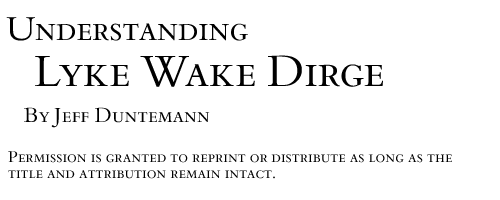|
This ae nighte, this ae nighte,
Every nighte and alle,
Fire and fleet and candle-lighte,
And Christe receive thy saule.
When thou from hence away art past,
Every nighte and alle,
To Whinny-muir thou com'st at last;
And Christe receive thy saule.
If ever thou gavest hosen and shoon,
Every nighte and alle,
Sit thee down and put them on;
And Christe receive thy saule.
If hosen and shoon thou ne'er gav'st nane
Every nighte and alle,
The whinnes sall prick thee to the bare bane;
And Christe receive thy saule.
From Whinny-muir whence thou may'st pass,
Every nighte and alle,
To Brig o' Dread thou com'st at last;
And Christe receive thy saule.
If ever thou gav'st silver and gold,
Every nighte and alle,
At t' Brig o' Dread thou'lt find foothold,
And Christe receive thy saule.
But if silver and gold thou never gav'st nane,
Every nighte and alle,
Down thou tumblest to Hell flame,
And Christe receive thy saule.
From Brig o' Dread whence thou may'st pass, Every nighte and alle,
To Purgatory fire thou com'st at last;
And Christe receive thy saule.
If ever thou gav'st meat or drink,
Every nighte and alle,
The fire sall never make thee shrink;
And Christe receive thy saule.
If meat or drink thou ne'er gav'st nane,
Every nighte and alle,
The fire will burn thee to the bare bane;
And Christe receive thy saule.
This ae nighte, this ae nighte,
Every nighte and alle,
Fire and fleet and candle-lighte,
And Christe receive thy saule.
|
On this night, on this night,
Every night and all,
Hearth and house and candle-light,
And Christ receive your soul.
When from here away you pass
Every night and all,
To Thorny Moor you come at last;
And Christ receive your soul.
If ever you gave hose and shoes,
Every night and all,
Sit then down and put them on;
And Christ receive your soul.
But if hose and shoes you gave none
Every night and all,
The thorns shall prick you to the bare bone;
And Christ receive your soul.
From Thorny Moor then you may pass,
Every night and all,
To Bridge of Dread you come at last;
And Christ receive your soul.
If ever you gave silver and gold,
Every night and all,
At Bridge of Dread you'll find foothold,
And Christ receive your soul.
But if silver and gold you gave none
Every night and all:
You'll tumble down into Hell's flames
And Christ receive your soul.
From Bridge of Dread then you may pass,
Every night and all,
To Purgatory fire you'll come at last;
And Christ receive your soul.
If ever you gave meat or drink,
Every night and all,
The fire will never make you shrink;
And Christ receive your soul.
But if meat or drink you gave none,
Every night and all,
The fire will burn you to the bare bone;
And Christ receive your soul.
On this night, on this night,
Every night and all,
Hearth and house and candle-light,
And Christ receive your soul.
|

